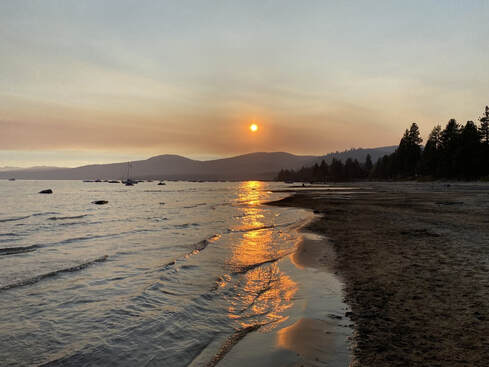|
This summer, the Caldor fire burned over 220,000 acres of forest just south of the Tahoe basin, destroying over a thousand structures that lay in its path. At one point, when South Lake Tahoe was being evacuated and strong winds were blowing the fire due north, many of us were afraid that our little blue paradise in the mountains was going to be lost forever. Our hearts go out to those who lost their homes and are now having to start their lives again from scratch. We truly owe a debt of gratitude to the brave firefighters who risked their lives to protect this place that we love and cherish.
Although the fire is now almost completely contained, the collective trauma that we recently endured is still very fresh in our minds. We all remember the desperate feeling of impending doom as the fire kept advancing toward us, as well as the weeks of hazardous air quality that made it unsafe to go outside. The anxious feeling of having absolutely no control over what happens next is difficult to shake. But, maintaining a state of inner tension simply can’t be healthy in the long run. How can we go back to enjoying life instead of worrying about it all the time? Here are some of the lessons we learned from living through this tragic event: 1. Understand the cause of stress. We are always hearing about how stress is all in our heads. By only thinking positive thoughts, the theory goes, you will never feel stressed again. But, when there is a massive wildfire advancing towards you, the stress that you feel is very real. Regardless of your ability to look on the bright side, the smell and sight of smoke activates an important survival mechanism. In order to increase your odds of surviving a fire, the body naturally amps you up to do one of two things: either fight against the fire or run away from the danger as quickly as possible. For those of us who stayed in town as the threat of destruction continued to grow, it is perfectly understandable that we were stressed out. Our naturally occurring fight or flight response, combined with our tendency to imagine the absolute worst case scenario- and then suffer from it as if it was real- meant that many of us were walking around on edge, ready to explode at the smallest inconvenience. Understanding why we felt so terrible as the fire was burning is an important step towards recovery. 2. Let go of your attachment to physical things. True freedom comes from being completely unattached to the physical world. When you think about who you are, you generally think, “I am this body.” But, on closer examination, we are so much more than just our bodies. We also identify ourselves with our possessions: our clothes, our computers and TV’s, our cars and our houses. We also cling tightly to our memories and to the things that remind us of our past. Where we live is also a big part of who we are. That’s why, as the fire got closer to home, it started to feel really personal. It felt like it wasn’t just Tahoe that was being threatened with total destruction- it was me. Tahoe is not just my home, it is my heart, my soul- my everything. My attachment to this particular physical world is so strong that, if Tahoe were to burn down, I would be absolutely devastated. The thought of losing this place, along with all of my valued possessions, was almost too much to bare at times. It takes a scare like this to realize just how strong our attachment to physical world is- and how much inner work remains before we can truly be free. 3. Release the need to control. An important lesson that came out of all this is the realization that the only thing we have control of is ourselves. When the fire was raging out of control, it was easy to go into a state of resistance to what is. This fire clearly should not be happening, therefore there must be some way to go back into the past and stop the blaze before it gets a chance to spread. If that isn’t possible, then perhaps we can use the power of our thoughts to put the fire out. Or, maybe if we pray fervently enough, the rain will come and miraculously extinguish it. In reality, there was absolutely nothing we could do about the wildfire except wait and watch as nature took its course. We learned that it is not our ability to control life’s events so much as our ability to control our internal reaction to life’s events that determines our long-term health and happiness. There are many other lessons learned from this tragic event such as the value of clean, fresh air. We also learned the importance of acting with kindness towards others when we were all under the same intense pressure. The thing to keep in mind is that, although we came very close to losing everything- we didn’t. The worst case scenario that everyone was afraid of did not come to pass. Remembering this gives us the opportunity to replace feelings of panic and desperation with a baseline feeling of gratitude and appreciation. It’s the difference between living with an open heart instead of one that is still closed and afraid. On the days when the air is clear and the sky is blue once again, we have even more reason to rejoice in the natural beauty of our surroundings and remember how lucky we are to be here.
12 Comments
|
Like what you are reading? Sign-up here for our weekly newsletter featuring a new inspirational blog every Wednesday.
About The AuthorNick Hughes is a massage therapist, yoga instructor and co-owner of Well Being. Influenced by the ideas of Alan Watts, Eckhart Tolle, Ram Dass, and Deepak Chopra, Nick presents his unique take on human existence with the goal of helping others live a happier life. Archives
July 2024
Categories |



 RSS Feed
RSS Feed